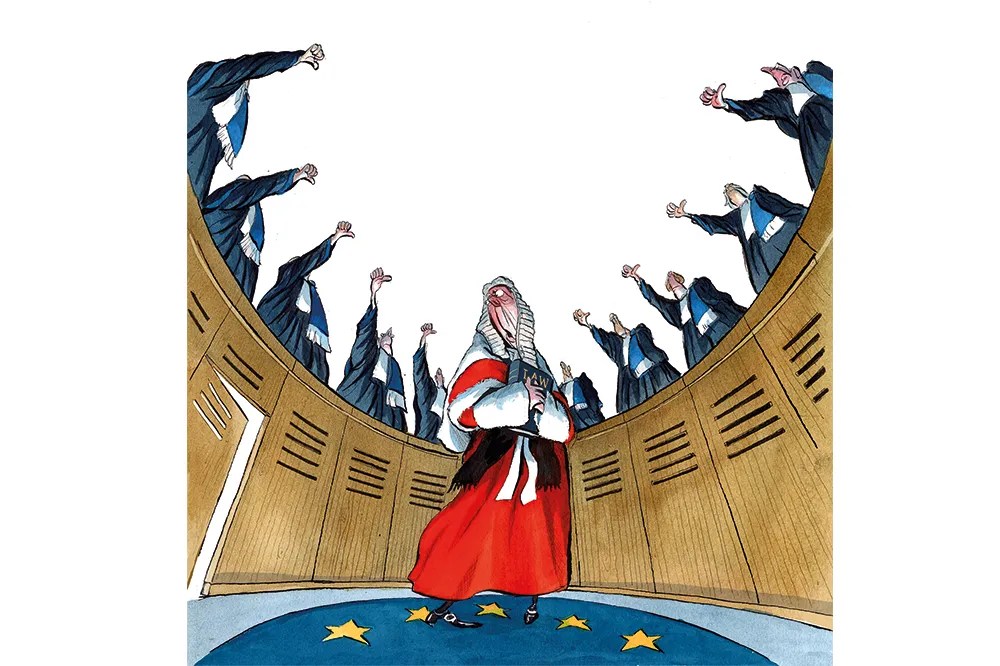If Europeans wanted evidence that it is judges and not politicians who run their countries this month has proved it.
At the start of February, the Rome court of appeal ordered that 49 migrants who had been rescued at sea and transferred to Albania – under the terms of an agreement struck between the two countries – be returned to Italy. It is the third time in four months that a court has intervened to thwart Prime Minister Giorgia Meloni’s attempt to combat illegal immigration.
According to the judges, sending migrants to Albania is a contravention of an EU court ruling that member states must assess the safety of a country to which it sends migrants. Albania is an official candidate for accession to the EU.
In the same week a court in France annulled the deportation order issued by Bruno Retailleau, the Minister of the Interior, to an Algerian social media ‘influencer’ called Doualemn. In addition the court ordered the state to pay Doualemn’s €1,200 legal costs.
The Algerian, who has a string of previous convictions to his name and has twice entered France illegally, was ordered to be deported after he posted a message calling for an Algerian dissident in France to be ‘made to suffer’.
An infuriated Retailleau reacted to the judgement by asking: ‘Should our law protect dangerous individuals or protect French society against dangerous individuals?’
A similar question was asked in Britain last week after an immigration tribunal ruled against the deportation of an Albanian criminal. One of the reasons for their decision was that it would be ‘unduly harsh’ on his ten-year-son’s culinary habits: specifically his aversion to ‘the type of chicken nuggets that are available abroad’.
As the British public digested that decision, another judge ruled against the Home Office in a case concerning a family of six Palestinians who wanted to settle in the UK. The government had rejected their claim because it was made through a scheme established for Ukrainian refugees but Judge Hugo Norton-Taylor said this decision was a breach of the family’s human rights.
These judgements are just the latest in a long list of decisions taken by judges that both baffle and anger the general public.
In 2014, for example, the European Court of Human Rights (ECHR) ordered Switzerland to stop the deportation of an Afghan family back to Italy because they might be accommodated in ‘overcrowded facilities’. The family had arrived in Italy in 2011 with a view to setting up home in Austria. When their claim was rejected they next chose Switzerland but here their asylum application was also thrown out.
This ECHR decision was in contravention of the Dublin Regulation, which stipulates that refugees must seek asylum in their EU country of entry. So, too, was the judgement of a German court in 2021 concerning two Syrian sisters. They had been granted protection status in Greece but decided they preferred Germany. The German migration authority, BAMF, ordered their expulsion but were overruled by the court in Lower Saxony because in Greece the sisters ‘do not receive any housing-related social benefits’.
Arguably the most ludicrous case was the one I highlighted last year of an Uzbekistan national in France. Considered to be a ‘dangerous radical Islamist’ (which he denied) by the French intelligence services, the Uzbek was expelled in December 2023 against the instructions of the ECHR. The case was considered by France’s Council of State, and they ordered the government to bring him back at their own expense.
In the same month a tough new immigration bill was passed in the French National Assembly, to the delight of Marine Le Pen’s National Rally and the centre-right Republicans.
Their joy was short-lived. Emmanuel Macron referred the bill to the Constitutional Court, the nine-strong body led by Laurent Fabius, a Socialist Prime Minister in the 1980s. They nullified 32 of the 86 articles and turned the bill into a soft and worthless piece of legislation.
The right were enraged. ‘A small caste has confiscated democracy,’ declared Eric Ciotti, leader of the Republicans.
Three months later the Republican party demanded a referendum on immigration – with the support of 69 per cent of the country – but the proposal was rejected by the Constitutional Court on the grounds it undermined ‘national solidarity in favour of disadvantaged people’. The Republicans accused the Court of a ‘judicial coup d’etat’.
The ‘small caste’ to which Ciotti referred is a socialist one that emerged out of the protests of 1968 and assumed power during the Mitterrand years. The Socialist party in France may have dwindled to insignificance electorally (in the last decade their seats in parliament have fallen from 280 to 66) but their ideologues dominate the judiciary, the media and the arts.
Laurent Fabius stands down next month as president of the Constitutional Court and Macron has nominated as his successor Richard Ferrand. Like Macron, Ferrand joined the Socialist party at a young age before transferring his allegiance to Macron’s En Marche! party in 2016.
Analysing the nomination of Ferrand, Catherine Rouvier, a professor in public law and political science (and a former municipal councillor in Le Pen’s party) said: ‘The left is populated by fighters, vigilant people who don’t hesitate to place their friends here and there as soon as they can, while the right tends to fall asleep. This is worrying because national sovereignty is gradually being eroded by the extension of the powers of the Constitutional Council.’
It is the same across Europe. While the right have spent the last 50 years asleep, the left have marched through the institutions. The consequences are seen in courts from London to Paris to Rome.








Comments